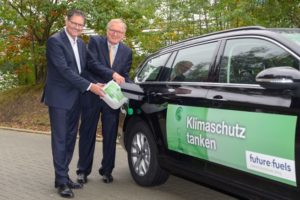Greenhouse gas-neutral fuels

From the left: Adrian Willig (IWO) and Dirk Claussen (MWV) refuelled a car with an e-fuel during the event. Photo: IWO
27 September 2019 – 150 experts from science and industry discussed the future of renewable fuels at the 3rd Technology Forum “New Liquid Energy Sources” on 26 September in Hamburg. In addition to presenting various production paths, the focus was on the future use of Future Fuels in mobility and heat supply.
“If we want to achieve our climate targets, renewable liquid energy sources will have to make an important contribution.†This assessment was confirmed by Adrian Willig, Managing Director of the Instituts für Wärme und Oeltechnik, and Dirk Claussen, Managing Director of the German Petroleum Industry Association. This makes it all the more important to make further progress in this area. During the event, both filled a car with a climate-neutral synthetic fuel (e-fuel) produced from “green” hydrogen and recycled CO2 using the Power-to-X process.
Both agreed: “The Federal Government’s commitment on the cornerstones of the climate protection programme to support the development of climate-friendly fuels from biomass and to create suitable framework conditions for the development and production of climate-neutral fuels, i.e. e-fuels, is a step in the right direction. Now it is important to take concrete measures to create a permanently reliable environment for the market launch – especially for investors. Now it is important to use concrete measures to create a permanently reliable environment for the market launch – especially for investors. However, concrete measures to support synthetic energy sources are largely lacking in the present resolutions – in contrast to the manifold and costly subsidies for electrical applications. The draft law now on the table will have to be substantially amended here.†In Hamburg, representatives of various Power-to-X initiatives discussed the conditions that must be met if market entry and the expansion of renewable fuels are to be successful.
Core elements in the production of renewable fuels are the production and use of hydrogen and its carbon compounds in closed cycles. The different raw material options and manufacturing processes as well as the various application possibilities for driving, flying and heating were presented on the basis of concrete projects. These included, for example, the “REDIFUEL” project, which deals with the sustainable use of various biogenic raw materials for the production of a renewable diesel biofuel, and the “KeroSyn100” project, which produces synthetic kerosene based on methanol. Advanced biofuels from algae were also presented.
Reducing fuel-related emissions is also an increasingly important issue in shipping. In addition to the long-term reduction of CO2 emissions, the focus is currently on local pollutant emissions. In the “MultiSchIBZ” project, fuel cells for on-board power generation are being tested, particularly in port operations. In addition, the heating market was an important part of the programme. Even if experts believe that a successful market ramp-up of synthetic liquid energy sources is indispensable in the transport sector, the advantages of future products could then also be used in the building sector.
The 3rd Technology Forum “New Liquid Energy Sources” was organized by the Institute für Wärme und Oeltechnik (IWO), the Mineralölwirtschaftsverband (MWV), the OWI Oel-Waerme Institute and TEC4FUELS GmbH. A detailed report about the technology forum can be found on IWO´s website.





